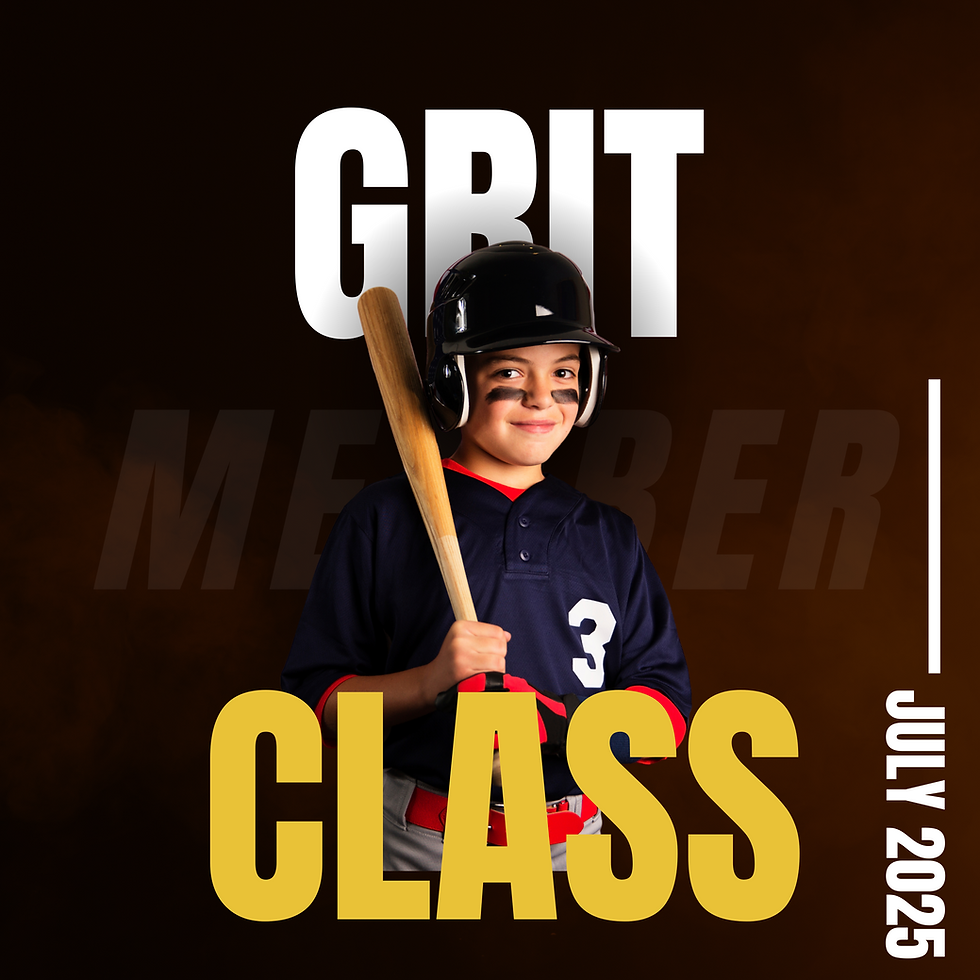Building Strong Foundations for Young Athletes
- GRIT Grizzly

- Jun 18, 2025
- 4 min read
The journey of young athletes begins far before they lace up their first pair of cleats or sneakers. It starts with building a solid foundation that encompasses physical, mental, and emotional development. Parents and coaches play a crucial role in this process. By prioritizing fundamental principles, we can nurture not just great athletes, but also well-rounded individuals.
Understanding the Needs of Youth Athletes
Youth athletes are at a critical stage of growth. Their bodies are still developing, and their skills are in the early stages of formation. It is essential to recognize that young athletes are not just mini adults. Their training should be tailored to their age, maturity level, and individual needs.
Statistics show that early specialization in sports can lead to burnout and injuries. According to the American Academy of Pediatrics, children should be encouraged to participate in a variety of sports rather than focusing solely on one. This approach not only develops a broader skill set but also keeps the experience enjoyable.
Fostering a Positive Environment
Creating a positive and supportive environment is paramount for young athletes. Coaches and parents should work together to establish a culture that prioritizes effort and improvement over victory.
Example: Instead of focusing solely on winning, adults can set goals around personal bests, teamwork, and skill development. Encouraging young athletes to celebrate their efforts and learn from their mistakes helps build resilience and a growth mindset.

As a coach or parent, consider implementing feedback sessions where young athletes can express their feelings about their training. When they feel heard, they become more engaged and willingly put in the effort to develop their skills.
Ensuring Proper Training and Nutrition
Physical training and nutrition play a central role in building strong foundations. Young athletes need age-appropriate training that promotes physical literacy, strength, and endurance.
Training Recommendations:
Focus on the Fundamentals: Teach basic movement patterns such as running, jumping, and throwing.
Incorporate Variety: Engage young athletes in multiple sports and activities, allowing them to develop different skills.
Emphasize Fun: Keep training light and enjoyable to foster a lifelong love for sports.
Nutrition is another critical area that can significantly impact performance. Educating young athletes about healthy eating habits can help them make better choices.
Nutrition Tips:
Focus on whole foods like fruits, vegetables, lean proteins, and whole grains.
Encourage proper hydration, especially during training sessions.
Discuss the importance of timing meals and snacks around training to optimize energy levels.

By prioritizing training and nutrition, parents and coaches can help young athletes build the physical capabilities they need to excel.
Mental Skills and Emotional Intelligence in Sports
In addition to physical training, young athletes must also develop mental resilience and emotional intelligence. The psychological aspect of sports can significantly influence performance.
Key Mental Skills to Develop:
Goal Setting: Teach young athletes to set realistic and achievable goals.
Visualization: Encourage them to visualize success to build confidence.
Mindfulness: Introduce practices that promote focus and reduce anxiety, such as breathing exercises or meditation.
Developing emotional intelligence is equally important. Helping young athletes understand their emotions and those of others can lead to improved teamwork and communication.
Practical Example: Create team-building exercises that require cooperation and empathy. Activities like trust falls, group discussions, or relay races can help young athletes learn to support each other and work as a cohesive unit.

Fostering these mental skills will not only help young athletes in sports but in other areas of life as well.
The Role of Parents and Coaches
Parents and coaches play integral roles in the development of young athletes. It is essential for both to be on the same page regarding expectations and values in sports.
What Parents Can Do:
Support their child’s interests without pressure.
Attend practices and games, offering encouragement without becoming overly critical.
Communicate with coaches to understand how they can best support their child.
What Coaches Can Do:
Create a structured yet flexible training environment.
Provide regular feedback and encourage individual improvement.
Develop strategies to engage parents in the process of youth sports development.
By fostering collaboration between parents and coaches, a consistent and supportive framework can be established for young athletes.
Emphasizing Lifelong Lessons
Sports are not merely about competition; they provide young athletes with essential life lessons.
Key Lessons from Sports:
Teamwork: Working together to achieve common goals.
Discipline: Putting in the effort to improve, even when it’s challenging.
Resilience: Learning to bounce back from setbacks and continue working toward success.
Encouraging young athletes to reflect on these lessons can be done through discussions after games and practices. Help them draw connections between their sports experiences and real-life situations.
Ultimately, the objective of youth sports should be to foster a love for activity and teamwork while cultivating skills that benefit them outside of the field or court.
Building strong foundations for young athletes is a multifaceted process. By emphasizing a balanced approach that includes physical training, emotional support, and life lessons, we can ensure that they grow into not just accomplished athletes but also responsible and well-rounded individuals.
Make sure to encourage exploration and growth in all areas of their lives. With the right support and encouragement, young athletes can thrive both in their sports endeavors and as individuals, paving the way for a healthy and active lifestyle.




Comments